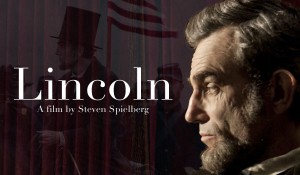LINCOLN: 4 ½ STARS
 Seen as a pair “Lincoln” and “War Horse” appear to usher in a new phase in Steven Spielberg’s career. No longer the Young Turk who made “Jaws,” or the blockbuster king of “Indiana Jones” or the family friendly maker of “ET,” he now is entering his golden age, or at least his homage to the golden age of Hollywood and the movies of his old-school heroes.
Seen as a pair “Lincoln” and “War Horse” appear to usher in a new phase in Steven Spielberg’s career. No longer the Young Turk who made “Jaws,” or the blockbuster king of “Indiana Jones” or the family friendly maker of “ET,” he now is entering his golden age, or at least his homage to the golden age of Hollywood and the movies of his old-school heroes.
Despite a running time of two-and-a-half hours, “Lincoln” focuses on a short period of time in the president’s career. Spielberg and “Angel’s in America” writer Tony Kushner have zeroed in on the months surrounding the backroom politics that allowed passage of the 13th Amendment—“Neither slavery nor involuntary servitude, except as a punishment for crime whereof the party shall have been duly convicted, shall exist within the United States, or any place subject to their jurisdiction.”—through the House of Representatives. Several stories run parallel, but the thrust of the narrative focuses on the passage of this historic document.
The first glimpse of Daniel Day-Lewis as Abraham Lincoln, the 16th President of the United States, feels like watching a Yankee five-dollar bill come to life. Day-Lewis takes a familiar character, seen on money, enshrined in marble at the National Mall in Washington, portrayed on stage and screen*, and brings him to vivid life.
It’s a remarkable performance that blends familiar historical details with personality to create real flesh and blood character, complete with all the iconic traits history has endowed on him, and quirkier qualities—his habit of telling long anecdotes, his occasional prickliness. It falls in line with history’s attempts to bestow sainthood on Honest Abe, but doesn’t ignore the president’s human side.
Day-Lewis’s work brings the myth of the man to life in a film filled with remarkable acting. Despite the worst wig in cinema history Tommy Lee Jones as Thaddeus Stevens, the radical Republican who wanted to give voting rights to freed slaves, makes the speeches in legislature sparkle with life and righteous indignation.
Sally Field sheds light on the misunderstood Mary Todd Lincoln–“All anyone will remember of me is that i was crazy and ruined your happiness,” she says—and James Spader provides a much-needed light touch as a proto lobbyist.
The glimpse of backroom politics, 19th century style, is fascinating, although restless viewers may find some of the colourful dialogue daunting. Many of the speeches sounds like Conrad Black on a bafflegab bender, so bring a dictionary if words like pulchritude throw you for a loop.
The final vote is somewhat drawn out for dramatic effect, but considering it is one of the most important ballots in American history–make that human history–it deserves the space to breathe dramatically.
Spielberg’s treatment of the story is respectful, but nuanced. He doesn’t shy away from showing Abe and Mary arguing, for instance, but the well-crafted film feels old-fashioned, like a throwback to another era when epic filmmaking didn’t necessarily mean showing planets exploding but showcasing epic ideas.
*Most famously by Canadian-born Raymond Massey, who played him multiple times on stage and on film. In fact, he was so attached to the character a colleague joked that Massey wouldn’t be satisfied with his Lincoln impression until someone assassinated him
